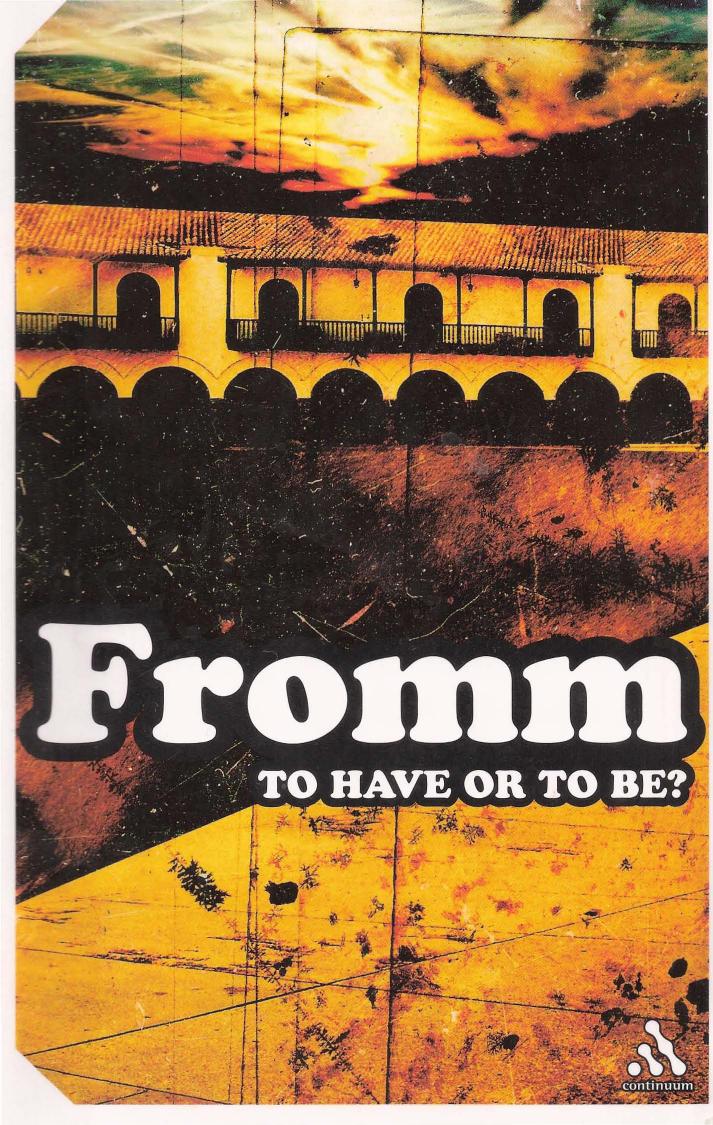To Have or to Be? by Erich Fromm

Author:Erich Fromm [Fromm, Erich]
Language: eng
Format: epub, pdf
Tags: Sociology, Social Science, Ontology, Philosophy, Humanism, Social ethics, General, Avarice, Self-Help, Social Psychology, Personality, Movements
ISBN: 9780826417381
Publisher: Continuum International Publishing Group
Published: 2005-09-06T02:49:26+00:00
VI
Further Aspects of Having and Being
Security—Insecurity
Not to move forward, to stay where we are, to regress, in other words to rely on what we have, is very tempting, for what we have, we know; we can hold onto it, feel secure in it. We fear, and consequently avoid, taking a step into the unknown, the uncertain; for, indeed, while the step may not appear risky to us after we have taken it, before we take that step the new aspects beyond it appear very risky, and hence frightening. Only the old, the tried, is safe; or so it seems. Every new step contains the danger of failure, and that is one of the reasons people are so afraid of freedom.
Naturally, at every state of life the old and accustomed is different. As infants we have only our body and our mother's breasts (originally still undifferentiated). Then we start to orient ourselves to the world, beginning the process of making a place for ourselves in it. We begin wanting to have things: we have our mother, father, siblings, toys; later on we acquire knowledge, a job, a social position, a spouse, children, and then we have a kind of afterlife already, when we acquire a burial plot and life insurance and make our "last will."
Yet in spite of the security of having, people admire those with a vision of the new, those who break a new path, who have the courage to move forward. In mythology this mode of existence is represented symbolically by the hero. Heroes are those with the courage to leave what they have—their land, their family, their property—and move out, not without fear, but without succumbing to their fear. In the Buddhist tradition the Buddha is the hero who leaves all possessions, all certainty contained in Hindu theology—his rank, his family —and moves on to a life of nonattachment. Abraham and Moses are heroes in the Jewish tradition. The Christian hero is Jesus, who had nothing and—in the eyes of the world—is nothing, yet who acts out of the fullness of his love for all human beings. The Greeks have secular heroes, whose aim is victory, satisfaction of their pride, conquest. Yet, like the spiritual heroes, Hercules and Odysseus move forward, undeterred by the risks and dangers that await them. The fairy tale heroes meet the same criteria: leaving, moving forward, and tolerating uncertainty.
We admire these heroes because we deeply feel their way is the way we would want to be—if we could. But being afraid, we believe that we cannot be that way, that only the heroes can. The heroes become idols; we transfer to them our own capacity to move, and then stay where we are—"because we are not heroes."
This discussion might seem to imply that while being a hero is desirable, it is foolish and against one's self-interest. Not so, by any means. The cautious, the having persons enjoy security, yet by necessity they are very insecure. They depend on what they have: money, prestige, their ego—that is to say, on something outside themselves.
Download
This site does not store any files on its server. We only index and link to content provided by other sites. Please contact the content providers to delete copyright contents if any and email us, we'll remove relevant links or contents immediately.
| Anthropology | Archaeology |
| Philosophy | Politics & Government |
| Social Sciences | Sociology |
| Women's Studies |
The remains of the day by Kazuo Ishiguro(8999)
Tools of Titans by Timothy Ferriss(8396)
Giovanni's Room by James Baldwin(7346)
The Black Swan by Nassim Nicholas Taleb(7129)
Inner Engineering: A Yogi's Guide to Joy by Sadhguru(6796)
The Way of Zen by Alan W. Watts(6614)
The Power of Now: A Guide to Spiritual Enlightenment by Eckhart Tolle(5782)
Asking the Right Questions: A Guide to Critical Thinking by M. Neil Browne & Stuart M. Keeley(5775)
The Six Wives Of Henry VIII (WOMEN IN HISTORY) by Fraser Antonia(5515)
Astrophysics for People in a Hurry by Neil DeGrasse Tyson(5190)
Housekeeping by Marilynne Robinson(4447)
12 Rules for Life by Jordan B. Peterson(4304)
Ikigai by Héctor García & Francesc Miralles(4274)
Double Down (Diary of a Wimpy Kid Book 11) by Jeff Kinney(4272)
The Ethical Slut by Janet W. Hardy(4253)
Skin in the Game by Nassim Nicholas Taleb(4250)
The Art of Happiness by The Dalai Lama(4130)
Skin in the Game: Hidden Asymmetries in Daily Life by Nassim Nicholas Taleb(4007)
Walking by Henry David Thoreau(3962)
